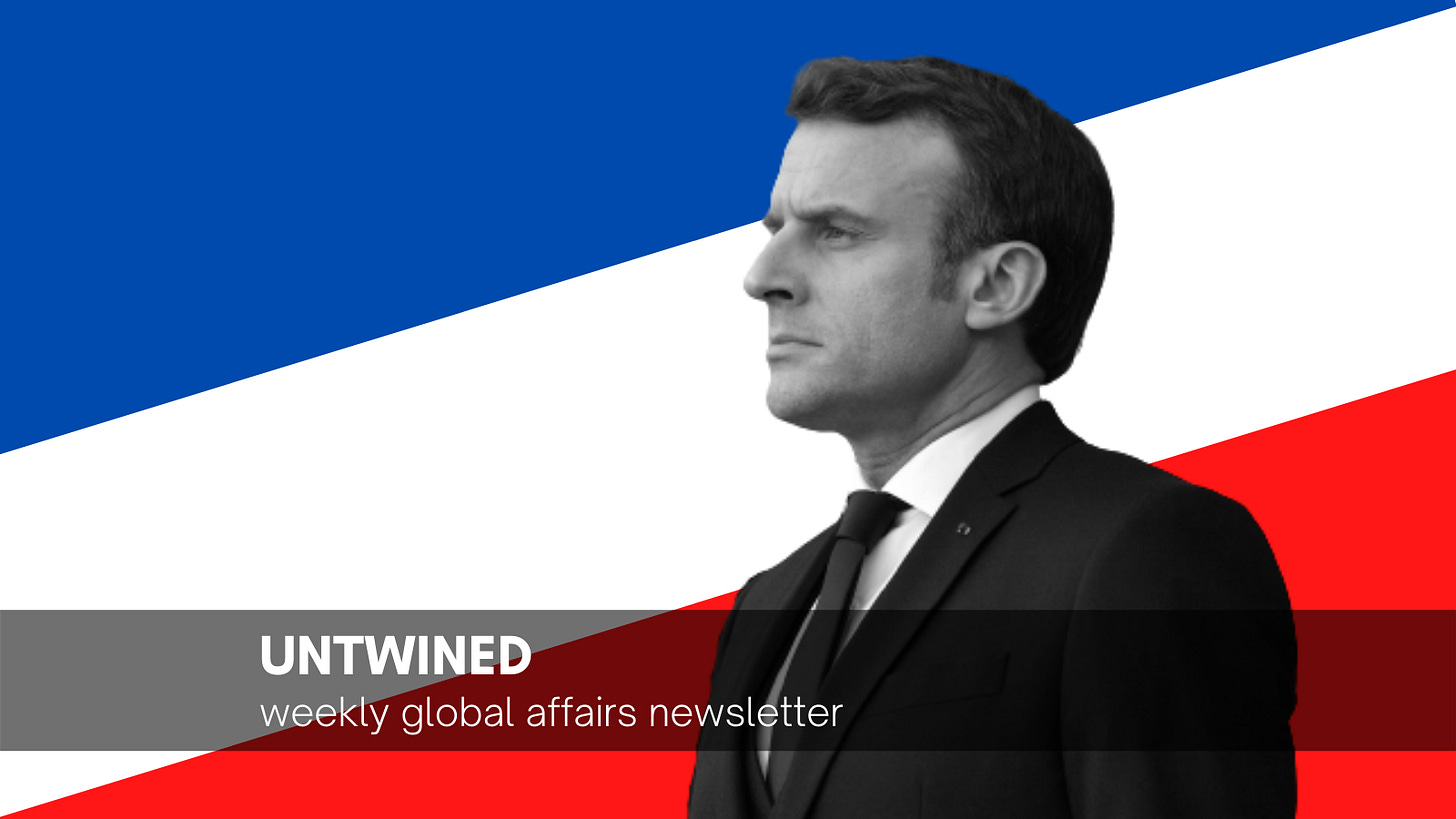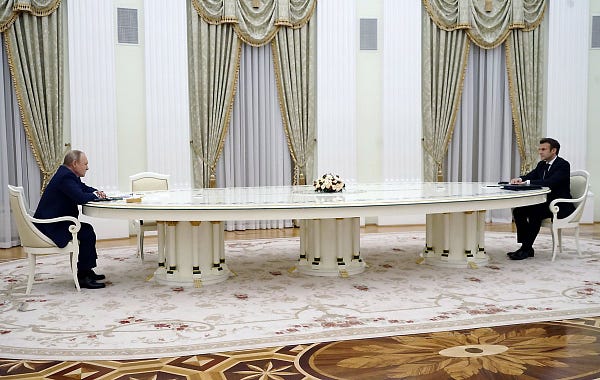Bonjour! I hope you have a wonderful weekend ahead and good luck to all those who still believe that Valentine’s Day is not a capitalist construct.
This week, we’re looking at how French President Emmanuel Macron is trying to play a greater role in Europe and how the exertion of influence is linked to his own re-election bid. We’re also looking at the continued rise of authoritarianism and democratic backsliding across the world, as reported by the Economist Intelligence Unit in its latest ‘Democracy Index 2021’ report. And, there’s more.
Thank you for reading Untwined.

This day that year
2011: After almost 30 years in power, Egypt’s president Hosni Mubarak stepped down after weeks of massive demonstrations seen as part of the larger ‘Arab Spring’ protests.
1929: The Kingdom of Italy and the Vatican signed the Lateran Treaty which recognised papal sovereignty over the Holy See.
Macron, Europe and re-election
Former German chancellor Angela Merkel is widely regarded as having been Europe’s chief trouble-shooter for the better part of the past two decades. May it be the Eurozone crisis, the 2014-15 Russia-Ukraine crisis, the 2015 migrant crisis and more recently, the COVID-19 pandemic, Merkel played a central role in developing a unified European response in times of trouble.
She was one of the key mediators between Ukraine, Russia and leaders of the eastern separatist regions of Ukraine. The ‘Normandy Format’ talks, in which she played an important role, led to the Minsk Protocol aimed at halting hostilities in the Donbas region of Ukraine. Now, with Merkel having stepped aside as Germany’s chancellor and having withdrawn from the European political stage, the continent is looking for someone to fill her shoes.
Watch — ‘A tireless crisis manager: The legacy of Angela Merkel’ by France24
Enter French President Emmanuel Macron. Macron is about to complete his first five-year tenure as the French head-of-state and is seeking re-election in April, while Germany’s new chancellor Olaf Scholz is still finding his feet. Some would argue that he is, perhaps, best suited to take the lead. The ongoing crisis that Europe finds itself in (regarding a potential conflict in eastern Europe) has come at an opportune time for Macron.
Incidentally, France is presiding over the Council of the European Union (which is held on a rotational basis) until June. The Council is one of the top decision-making bodies in the EU and its presidency will allow France to drive the EU’s legislative agenda. France is an important nation both within and outside the EU. Thus, its sitting president does hold a lot of influence. In recent weeks, Macron has been trying to use this influence to help resolve the crisis between Russia and Ukraine. Before meeting Ukrainian President Volodymyr Zelensky in Kiev this week, Macron told reporters that Russian President Vladimir Putin had assured him in Moscow that he won’t escalate the matter further. If true, this would have been a breakthrough. However, the Kremlin later denied making such promises. Irrespective of whether or not Macron had been able to extract a promise from Putin, his growing role in negotiations and the will to engage in tricky matters are evident.
‘Great power’ influence
France is one of the nations widely considered to be a “great power” — a term used to describe countries that hold massive influence over multiple regions of the world. This influence comes not only from historical factors and territorial possessions, but also from current economic might. Even though French influence is still clearly evident in the African region of Sahel (where France regularly deploys its peacekeeping forces), and in other places such as Lebanon, eastern Mediterranean and even Libya, some argue that French influence has been fading in recent years.
From the outside, it does look like Macron is making attempts to hold on to and harness that influence.
Timing matters
There’s another reason why Macron has been going out of his way to project power and influence: re-election. The Russia-Ukraine crisis is unfolding with just a couple of months to go for the crucial French presidential election. Macron is currently leading according to opinion survey results, but he fully understands that anything is possible in politics. Until 10 months ago, he was trailing in opinion polls.
The 44-year-old centrist is expected to face a challenge from far-right candidate Marine Le Pen (who was a major contender in the 2017 polls as well) and conservative candidate Valérie Pécresse. The Economist’s statistical forecasting model is predicting that Macron would be locked in a close second round contest with Pécresse. Check out those details here.
It’s a simple proposition: if Macron is able to emerge, even partly, as Europe’s new trouble-shooter, it will benefit him tremendously at the domestic level. As J. Alex Tarquinio argues in Foreign Policy, Macron has tied his re-election to Europe.
Pin it on the map
Time for some head scratching: This satellite image shows the former capital of a southeast Asian nation. It is the country’s most populous city and remains its economic backbone. It has a lot of historical significance. Bahadur Shah Zafar, the last Mughal Emperor, lived in exile here. It was also under occupation of an Axis power during the Second World War. What place is this?
The answer is at the bottom.
What else?
Updated democracy index
The Economist Intelligence Unit released its 2021 Democracy Index this week. It’s an annual ranking meant to show the health of democracy in each country. The accompanying report has warned of continued rise in authoritarianism and further democratic backsliding across the world. The average global score has fallen from 5.37 (out of 10) in 2020 to 5.28 last year.
I’m only listing some interesting points from the latest report titled ‘Democracy Index 2021: The China Challenge’. The full report can be accessed on their website.
The report explores the challenges China’s rise and its political model poses to democracies around the world.
As expected, Norway and Finland are leading the ranking with the highest overall scores of 9.75 and 9.37 (out of 10), respectively.
Afghanistan (where the Taliban took over last year) and Myanmar (where the military staged a coup) are now ranked last on the index. The spot was held by North Korea until last year.
Zambia, Indonesia, Qatar, Moldova, India, the Democratic Republic of Congo, Montenegro, Guyana, Uruguay, and jointly the United Arab Emirates and Singapore are the 10 nations that have shown the most improvement in their democracy index scores. However, the report suggests that these improvements can be “open to different interpretations”. For example, the Democratic Republic of Congo and Qatar’s improvements are happening on a low base, and India’s improvement of 0.3 points comes after a loss of 1.2 points between 2016 and 2020.
Spain and Tunisia have been downgraded to “flawed democracy” and “hybrid regime” status, respectively.
Though it continues to score well on the index, Canada’s performance in 2021 was “considerably lower” year-on-year.
Belarus-Ukraine military exercise
Belarus and Russia started a 10-day military exercise on February 10. While the two former Soviet bloc nations have close military ties and have held such drills regularly, the timing of the latest exercise named “Allied Resolve-2022” gives it greater significance. More than 100,000 Russian soldiers are positioned along the Russia-Ukraine borders – leading to concerns in Kiev and the West of s possible Russian invasion. Belarus is situated just north of Ukraine. In fact, the fastest land route for Russian forces to reach the Ukrainian capital of Kiev is not from the east, but would be from the north (via Belarus).
The current Russian deployment (more than 30,000 personnel and advanced fighter jets) in Belarus is the largest since the Cold War, according to NATO Secretary General Jens Stoltenberg. Thus, the exercise is being closely monitored by NATO — which is supporting Ukraine — and Kiev to make sure that the exercise doesn’t turn out to be a cover for something else.
Quad foreign ministers meet
Foreign affairs ministers of the Quad nations are meeting in Melbourne to discuss “positive and ambitious agenda in support of a secure and prosperous Indo-Pacific”. Australian Foreign Affairs Minister Marise Payne is hosting Indian External Affairs Minister S Jaishankar, Japanese Foreign Affairs Minister Hayashi Yoshimasa and US Secretary of State Antony Blinken.
They will discuss a wide range of issues including the recovery from the COVID-19 pandemic, vaccine distribution, cyber and critical technology, countering disinformation, counterterrorism, maritime security, humanitarian and disaster response, and climate change, according to a statement by the Australian foreign minister.
They are expected to discuss a number of other matters including the ongoing Russia-Ukraine crisis and access to 5G technology.

This will be the third in-person meeting of foreign ministers representing the four member nations of the Quadrilateral Security Dialogue. While the formation of Quad had taken time, the grouping has grown in stature quickly over the past two years – perhaps driven by a better understanding of common threats and goals more than ever before.
Australia reopens
Australia announced on February 7 that it will reopen its borders to vaccinated travellers starting February 21, about two years after the country first shut itself to the outside world amid concerns of COVID-19’s spread. Australia has had one of the world’s strictest border closures since the pandemic started. While some were able to travel to Australia in recent months, others such as tourists were barred from entry. The decision to allow vaccinated individuals to enter Australia is likely to boost the tourism and hospitality sectors, but it also sounds a death knell for Canberra’s ‘COVID zero’ strategy.
Interesting stuff
Beijing has been monitoring the Russia-Ukraine crisis, “seeing it as a test of American influence and resolve”. The tensions in eastern Europe and a lack of US’ response in a potential event where Russia invades Ukraine could encourage the Chinese leadership to capture Taiwan — by force if necessary. And for Taipei, the crisis is a “test of the strategic assumption that lies at the core of the island’s defence: that American military forces would intervene to stop a Chinese invasion.” Read Amy Qin and Steven Lee Myers’ full story in The New York Times.
C. Raja Mohan writes in Foreign Policy that while it may look like India has no stakes in the Russia-Ukraine crisis, those tensions pitting New Delhi’s long-standing partner Moscow “against its new Western friends” in Washington DC is discomforting. “Renewed warfare in Europe will make it harder to construct peace and security in Asia, which have already been destabilised by China’s rapid rise and growing assertiveness.” Read the full piece here.
To boost his re-election campaign, Prime Minister Viktor Orbán is reportedly inviting former US president Donald Trump to Hungary. Read the full report here.
‘Pin it on the map’ answer: Yangon (or Rangoon), Myanmar. Yangon is Myanmar’s most populous city. It is situated near the Gulf of Martaban, just up the Yangon River. It was occupied by Imperial Japan during the Second World War. It was Myanmar’s capital until 2006, when the military regime — called the “junta” — moved the capital to the purpose-built city of Naypyidaw. Yet, it continues to drive the country’s economy.
Before you go…
Please ‘follow’ us on Twitter and Instagram if you haven’t already. That’s where all the mid-week updates go.
I always look forward to your feedback. You can also send a quick email to untwinednewsletter@gmail.com (I really read and respond to all of them).







